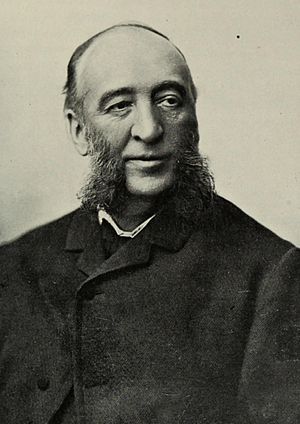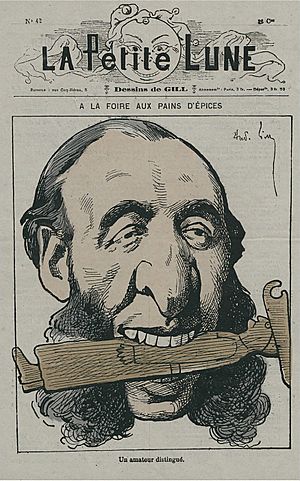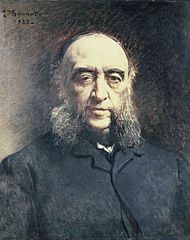Jules Ferry facts for kids
Quick facts for kids
Jules Ferry
|
|
|---|---|
 |
|
| President of the French Senate | |
| In office 24 February 1893 – 17 March 1893 |
|
| Preceded by | Philippe Le Royer |
| Succeeded by | Paul-Armand Challemel-Lacour |
| Prime Minister of France | |
| In office 21 February 1883 – 30 March 1885 |
|
| President | Jules Grévy |
| Preceded by | Armand Fallières |
| Succeeded by | Henri Brisson |
| In office 23 September 1880 – 10 November 1881 |
|
| President | Jules Grévy |
| Preceded by | Charles de Freycinet |
| Succeeded by | Léon Gambetta |
| Minister of Public Education and Fine Arts | |
| In office 21 February 1883 – 20 November 1883 |
|
| Prime Minister | Jules Grévy |
| Preceded by | Jules Duvaux |
| Succeeded by | Armand Fallières |
| In office 30 January 1882 – 29 July 1882 |
|
| Prime Minister | Charles de Freycinet |
| Preceded by | Paul Bert |
| Succeeded by | Jules Duvaux |
| In office 4 February 1879 – 10 November 1881 |
|
| Prime Minister | William Waddington Charles de Freycinet< Himself |
| Preceded by | Agénor Bardoux |
| Succeeded by | Paul Bert |
| Member of the French Chamber of Deputies for Vosges |
|
| In office 8 February 1871 – 6 October 1889 |
|
| Preceded by | Louis Buffet |
| Succeeded by | Ernest Picot |
| 10th Mayor of Paris | |
| In office 15 November 1870 – 5 June 1871 |
|
| Preceded by | Étienne Arago |
| Succeeded by | Office abolished Jacques Chirac (1977) |
| Member of the French Legislative Body for Seine |
|
| In office 8 June 1869 – 8 February 1871 |
|
| Preceded by | Émile Ollivier |
| Succeeded by | Charles Floquet |
| Personal details | |
| Born |
Jules François Camille Ferry
5 April 1832 Saint-Dié-des-Vosges, Vosges, Kingdom of France |
| Died | 17 March 1893 (aged 60) Paris, Seine, French Republic |
| Political party | "Close" Republicans (1869–1871) Opportunist/Republican Left (1871–1888) National Republican Association (1888–1893) |
| Spouse |
Eugénie Risler
(m. 1875; his d. 1893) |
| Profession | Journalist, lawyer |
Jules François Camille Ferry (born April 5, 1832 – died March 17, 1893) was an important French statesman and a strong supporter of the republic. He was a leader of the Moderate Republicans. He served as the Prime Minister of France twice, from 1880 to 1881 and again from 1883 to 1885. Ferry is best known for making public education available to everyone and for expanding France's colonial empire.
Contents
Biography
Early Life and Political Beginnings
Jules Ferry was born in Saint-Dié-des-Vosges, France. His family had a history of being bellmakers. His grandfather was even a mayor of Saint-Dié. Jules Ferry first studied law and became a lawyer in Paris in 1854.
However, he soon became interested in politics and started writing for newspapers like Le Temps. He strongly criticized the government of the Second French Empire. He was especially against Baron Haussmann, who was in charge of Paris. Ferry's articles criticizing Haussmann were later published as a book.
Rising in Politics
In 1869, Jules Ferry was elected as a republican representative for Paris. He spoke out against France going to war with Germany. When the Government of National Defense was formed in September 1870, he was put in charge of Paris.
This was a very difficult job because Paris was under siege. After the Paris Commune, a period of civil unrest, he had to resign in June 1871. From 1872 to 1873, he served as a minister in Athens. He then returned to France as a representative for Vosges and became a key leader of the Opportunist Republicans.
Ferry joined the first republican government in 1879. He served as a minister until 1885, mostly as Minister of Education or Minister of Foreign Affairs. He was Prime Minister twice, from 1880 to 1881 and from 1883 to 1885. He was also an active Freemason.
Making Education for Everyone
Two of Jules Ferry's biggest achievements were reforming public education and expanding France's colonies. Ferry believed that a modern and successful France needed reason to guide it, not just religion. School reforms were a major part of his plan.
He wanted to reduce the influence of the clergy (religious leaders) in universities. He aimed to create a strong system of republican schools. He passed important laws in 1881 and 1882, known as the Jules Ferry laws. These laws made primary education in France free, non-religious (meaning no religious instruction), and mandatory for all children.
Under his leadership, the number of university professors who supported the Republic doubled. These professors were sometimes called the "Republic's black hussars." Ferry's education policies also made French the main language taught in schools. While this helped unite France, it also led to the decline of many regional languages.
Expanding France's Colonies
After France's military defeat by Prussia in 1870, Ferry thought France should build a large colonial empire. He believed this would help France economically.
In 1882, as Minister of Public Instruction, Jules Ferry sent a team to explore Tunisia. This team included botanists and naturalists. Later, a geology section was added to this mission.
In a speech in 1884, he said that powerful nations had a "duty to civilize" other nations. Ferry played a key role in establishing a French protectorate in Tunis in 1881. He also helped prepare for the occupation of Madagascar in 1885. He supported the exploration of the Congo and Niger regions.
Most importantly, he organized the conquest of Annam and Tonkin, which became part of French Indochina. This led to a war with Qing dynasty China, which claimed control over these areas. French troops had a sudden retreat from Lạng Sơn during this war. This event, known as the Tonkin Affair, caused a lot of anger in Paris. It led to Ferry's downfall and he lost his position as Prime Minister in March 1885.
Even though the peace treaty with China, which gave France control over Annam and Tonkin, was signed by his government, Jules Ferry never served as Prime Minister again.
Views on Algeria
In the 1890s, Jules Ferry visited Algeria and wrote a report about it. He believed there would be conflict between the local people (Indigènes) and the European settlers.
- He wanted to provide education to the local people, but the settlers were not keen on this idea.
- He noticed that the settlers did not want to pay taxes.
- He also saw that the local people were contributing to the government without getting enough benefits.
- He thought the settlers were not well-chosen and that there were too many of them.
- He supported Algeria governing itself but felt the settlers were not ready for it.
- He believed that Muslims did not want French citizenship, military service, or French laws.
- He thought Muslims wanted lower taxes, more taxes used for their needs, and more involvement of Muslim leaders in city councils.
- He also felt that the land laws were not working well.
Working with Germany
Jules Ferry had a unique approach to Germany. Unlike most French politicians who wanted revenge for the 1870 defeat and to reclaim Alsace-Lorraine, Ferry believed it was better to cooperate with Germany. He thought Germany was too powerful to confront.
The German leader, Otto von Bismarck, was often worried about France. When Ferry offered a friendly approach, Bismarck responded positively. A friendship between France and Germany would help Bismarck with his own alliances. Bismarck even approved of France's colonial expansion under Ferry. He encouraged cooperation between France and Germany in building empires, especially against the British Empire.
This cooperation led to a race for influence in Africa, which almost caused a war between Britain and France in 1898 at Fashoda. However, by then, both Bismarck and Ferry had passed away. The friendly policy between France and Germany ended when Ferry left office. The Fashoda incident eventually led to Britain and France discussing their colonial goals and agreeing to support each other. This was an important step towards the Entente Cordiale in 1904, which brought the two countries closer.
Later Life and Legacy
Even after losing his position as Prime Minister, Jules Ferry remained an important member of the moderate republican party. He opposed General Boulanger, a popular figure who threatened the Republic.
In 1887, Ferry was a candidate for president, but he did not get enough support and withdrew. On December 10, 1887, a man named Aubertin tried to assassinate Jules Ferry. Ferry later died on March 17, 1893, from complications related to this wound. The French parliament held a state funeral for him.
Images for kids
See also
 In Spanish: Jules Ferry para niños
In Spanish: Jules Ferry para niños
 | Tommie Smith |
 | Simone Manuel |
 | Shani Davis |
 | Simone Biles |
 | Alice Coachman |




